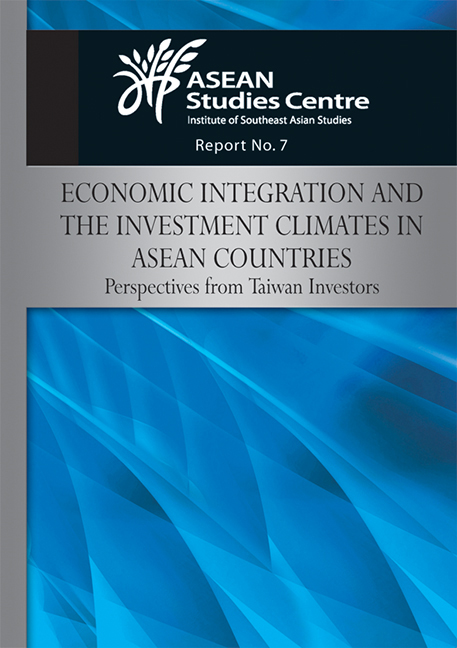 Economic Integration and the Investment Climates in ASEAN Countries
Economic Integration and the Investment Climates in ASEAN Countries Book contents
- Frontmatter
- Contents
- Introduction
- I Economic Integration and the Investment Climates in ASEAN Countries: Perspectives from Taiwan Investors
- II Background Papers
- 1 Taiwan and ASEAN Economic Interaction: Prospects and Opportunities
- 2 Taishang: A Different Kind of Ethnic Chinese Business in Southeast Asia
- 3 ASEAN Economic Integration and Taiwan
- 4 ASEAN's Bilateral Free Trade Agreements: Benefits and Challenges for the Region
- Annex I: Programme of the Symposium
1 - Taiwan and ASEAN Economic Interaction: Prospects and Opportunities
from II - Background Papers
Published online by Cambridge University Press: 21 October 2015
- Frontmatter
- Contents
- Introduction
- I Economic Integration and the Investment Climates in ASEAN Countries: Perspectives from Taiwan Investors
- II Background Papers
- 1 Taiwan and ASEAN Economic Interaction: Prospects and Opportunities
- 2 Taishang: A Different Kind of Ethnic Chinese Business in Southeast Asia
- 3 ASEAN Economic Integration and Taiwan
- 4 ASEAN's Bilateral Free Trade Agreements: Benefits and Challenges for the Region
- Annex I: Programme of the Symposium
Summary
This paper is an attempt to look at economic interactions between Association of Southeast Asian Nations (ASEAN) and Taiwan since the late 1980s, which reflect on the forces of regionalization and globalization. Its underlying intention is to develop some insights into issues, which argue that ASEAN and Taiwan have created a format for regional economic partnerships. These insights may facilitate a flexible approach towards an examination of the prospects and opportunities between them in the era of regionalization and globalization. As a hypothesis, if there are constraints (that is, without formal relations between Taiwan and ASEAN countries) or opportunities (that is, long-term economic interdependence between Taiwan and ASEAN) in trying to target a goal of comprehensive cooperation between ASEAN and Taiwan, it would require the use of political and economic approaches to examine these specific issues.
As its methodology, this paper uses mainly trade and investment data between Taiwan and six of ASEAN's member-countries (ASEAN-6) to indicate the complementary attributes of ASEAN countries and Taiwan. It is further shown that economic forces, driven by foreign direct investment and trade, have built a sense of a regional economic community between Taiwan and the ASEAN-6 since the late 1980s. From a practical perspective, the emergence of close economic relations among Taiwan and ASEAN-6 reflects the fact that these countries pursued their economic comparative advantages so as to maintain their global competitiveness. Based on the above, this paper is structured as follows. Section 1 explores the notion of regionalization and globalization, which helps us to understand the essence of common interests between ASEAN and Taiwan. It is argued that cooperation between ASEAN and Taiwan should be regarded as a means or process undertaken by individual countries to pursue national, regional and global interests.
- Type
- Chapter
- Information
- Economic Integration and the Investment Climates in ASEAN CountriesPerspectives from Taiwan Investors, pp. 25 - 47Publisher: ISEAS–Yusof Ishak InstitutePrint publication year: 2009


